Sometimes two halves don’t make a whole.
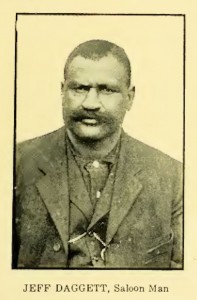 In an era when the South was rigidly segregated, Jeff Daggett, half black, half white, was always the son in the shadows, the skeleton in the closet of a proud white family, the secret that everyone in town knew. (Photo from History and Directory of Fort Worth.)
In an era when the South was rigidly segregated, Jeff Daggett, half black, half white, was always the son in the shadows, the skeleton in the closet of a proud white family, the secret that everyone in town knew. (Photo from History and Directory of Fort Worth.)
The “Daggett” name is among the most prominent in Fort Worth history. Three brothers—Ephraim Merrell, Henry Clay, and Charles Biggers—were Fort Worth pioneers and instrumental in the town’s development.
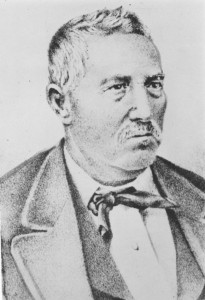 Ephraim Merrell Daggett especially was an early civic leader, known as the “father of Fort Worth.” In fact, in 1873, when Fort Worth incorporated, the city placed Ephraim Merrell Daggett’s likeness on the city seal. Ephraim and his first wife Pheneba had one son, born in 1838: Ephraim Beck Daggett. Pheneba died in childbirth, and Ephraim later married Caroline Nored. (Photo from Tarrant County College Northeast.)
Ephraim Merrell Daggett especially was an early civic leader, known as the “father of Fort Worth.” In fact, in 1873, when Fort Worth incorporated, the city placed Ephraim Merrell Daggett’s likeness on the city seal. Ephraim and his first wife Pheneba had one son, born in 1838: Ephraim Beck Daggett. Pheneba died in childbirth, and Ephraim later married Caroline Nored. (Photo from Tarrant County College Northeast.)
Ephraim Merrell Daggett had brought his family and slaves to Fort Worth in 1854 from Shelby County in east Texas and established a plantation at the south end of today’s downtown. The Daggett home was located where the convention center is today.
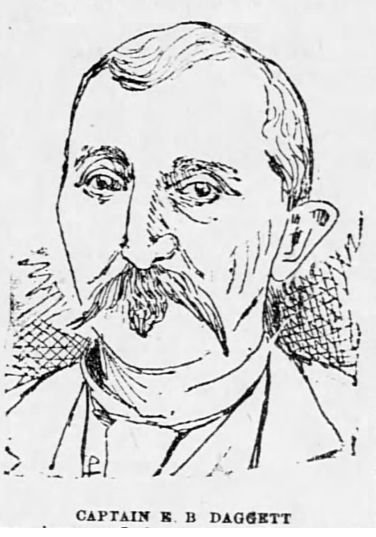
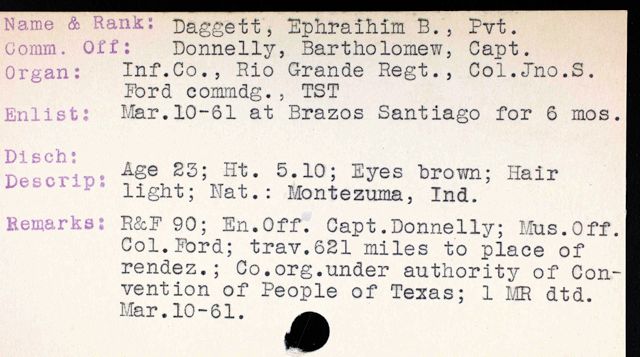 Son E. B., born in Missouri in 1838, enlisted in the Confederate Army in 1861, but by 1863—the year of Lincoln’s Emancipation Proclamation—Daggett was back on the family plantation. There in 1863 he fathered a child by Daggett plantation slave Matilda Smith. Because baby Jefferson was born to a slave woman, he had no birth certificate; on documents throughout his life his father was listed as “unknown.” (Sketch is from 1888.)
Son E. B., born in Missouri in 1838, enlisted in the Confederate Army in 1861, but by 1863—the year of Lincoln’s Emancipation Proclamation—Daggett was back on the family plantation. There in 1863 he fathered a child by Daggett plantation slave Matilda Smith. Because baby Jefferson was born to a slave woman, he had no birth certificate; on documents throughout his life his father was listed as “unknown.” (Sketch is from 1888.)
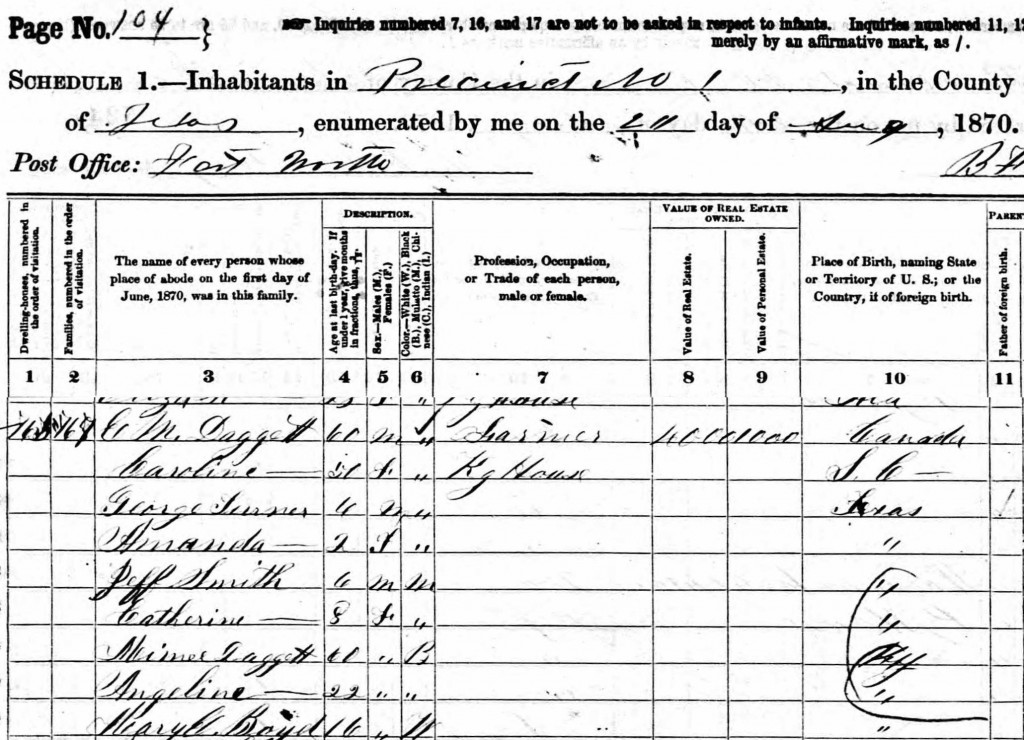
In the 1870 census Jeff, then six, was listed as “Smith” in the Daggett household. He apparently had an older sister Catherine. Both are listed as “m” for “mulatto.” The two Turner children listed, George and Amanda, surely are relatives of Charles Turner, who was Ephraim M. Daggett’s son-in-law. Notice that two African-American members of the household—Mimee and Angeline—are listed by the Daggett surname.
Notice, too, that Jeff’s father E. B. Daggett is not listed. In 1866, three years after Jeff was born, E. B. married Elizabeth Jane Marsh in Dallas. The couple moved to Bryan and to Waco before returning to Fort Worth.
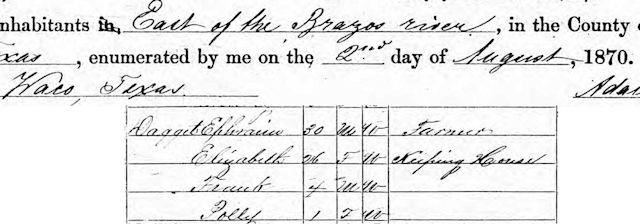
E. B. Daggett was a farmer in McLennan County in 1870.
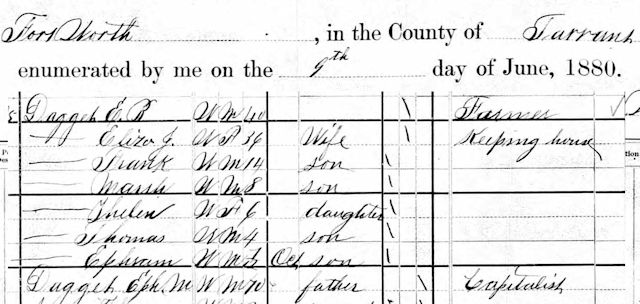 But by 1880 E. B. was back in Fort Worth, and his father, family patriarch and “capitalist” Ephraim Merrell, then seventy, was living with E. B. and his family.
But by 1880 E. B. was back in Fort Worth, and his father, family patriarch and “capitalist” Ephraim Merrell, then seventy, was living with E. B. and his family.
Ephraim Merrell died in 1883, leaving nothing in his will to his only son, perhaps because of the perceived shame brought upon the family, in that era, by E. B.’s miscegenation. (E. B. was, by the way, a member of the Ku Klux Klan.)
But if E. B. Daggett was estranged from his father, Jeff suffered far more: His kinship was not acknowledged by his white Daggett kin. Jeff left the Daggett plantation after his grandfather died. Perhaps in defiance of the family who refused to acknowledge him, Jeff took with him one prized Daggett possession: the Daggett name.
Out on his own in the South of the 1800s, Jeff Daggett, being half white, half black, surely found it difficult to be wholly accepted by either race and found it easy to bear a grudge against both, especially whites. Beginning in 1885, for the next quarter-century the name of Jeff Daggett was in local papers for negative news almost as often as his Daggett family members were in the local papers for positive news.
 Jeff became a “sport”: a gambler. (Clip is from the November 21, 1891 Gazette.) On Main Street in Hell’s Half Acre Jeff also operated a saloon that catered to African Americans. (Much of Hell’s Half Acre was located on the 320 acres platted as “Daggett Addition”—land once owned by Ephraim Merrell Daggett.) Fort Worth historian Dr. Richard Selcer writes in Fort Worth Characters that Jeff Daggett also served as a police informant on occasion.
Jeff became a “sport”: a gambler. (Clip is from the November 21, 1891 Gazette.) On Main Street in Hell’s Half Acre Jeff also operated a saloon that catered to African Americans. (Much of Hell’s Half Acre was located on the 320 acres platted as “Daggett Addition”—land once owned by Ephraim Merrell Daggett.) Fort Worth historian Dr. Richard Selcer writes in Fort Worth Characters that Jeff Daggett also served as a police informant on occasion.
 That chip on Jeff Daggett’s shoulder found expression in his trigger finger. These six clips cover an assault on police officer John J. Fulford, murder, assault with a deadly weapon, and abusive language with pistol drawn.
That chip on Jeff Daggett’s shoulder found expression in his trigger finger. These six clips cover an assault on police officer John J. Fulford, murder, assault with a deadly weapon, and abusive language with pistol drawn.
In the second clip, if Daggett served time for the Vaughn murder, he didn’t serve long: Two years later Daggett fired shots at a woman identified by the newspaper as “Becky Daggett” (his wife’s name was “Hester”). Well into the twentieth century newspapers and city directories identified African Americans by race.
Notice that Daggett was indicted at the same time as J. W. Davis, who had killed merchant Burwell Christmas Evans on July 6, 1889.
Notice also that local newspapers did not mention Jeff’s relationship to the Daggett family.
(Clips are from, top to bottom, December 23, 1885 Gazette; September 12, 1889 Gazette; June 6, 1891 Gazette; January 13, 1897 Register; May 12, 1904 Telegram; July 7, 1909 Star-Telegram.)
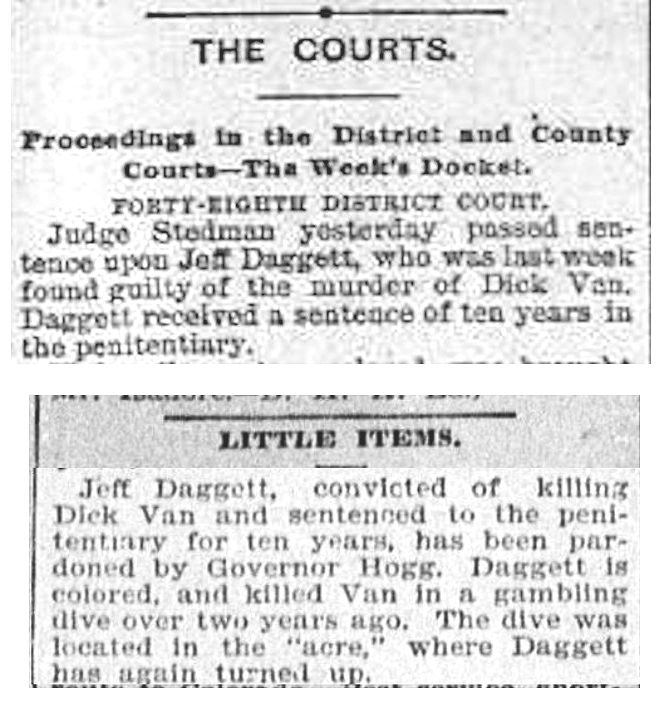 In 1892 Jeff Daggett was convicted of murdering fellow gambler Dick Van and sentenced to ten years in Huntsville. He was pardoned after two years. (Clips are from the March 15, 1892 and August 9, 1894 Gazette.)
In 1892 Jeff Daggett was convicted of murdering fellow gambler Dick Van and sentenced to ten years in Huntsville. He was pardoned after two years. (Clips are from the March 15, 1892 and August 9, 1894 Gazette.)
Jeff’s father E. B. Daggett had been an alderman from the Third Ward, which included Hell’s Half Acre. As an alderman he pushed for Fort Worth’s first dedicated high school. He also was a prominent businessman, dealing in real estate. But E. B., too, would occasionally cause his family members to squirm. Selcer, in his Hell’s Half Acre, writes that E. B. Daggett was among the prominent local businessmen who posted bond for madam Mary Porter when she was arrested for keeping a disorderly house (brothel) in Hell’s Half Acre. Selcer writes that in 1890 E. B. Daggett himself was convicted of “keeping a disorderly house.”
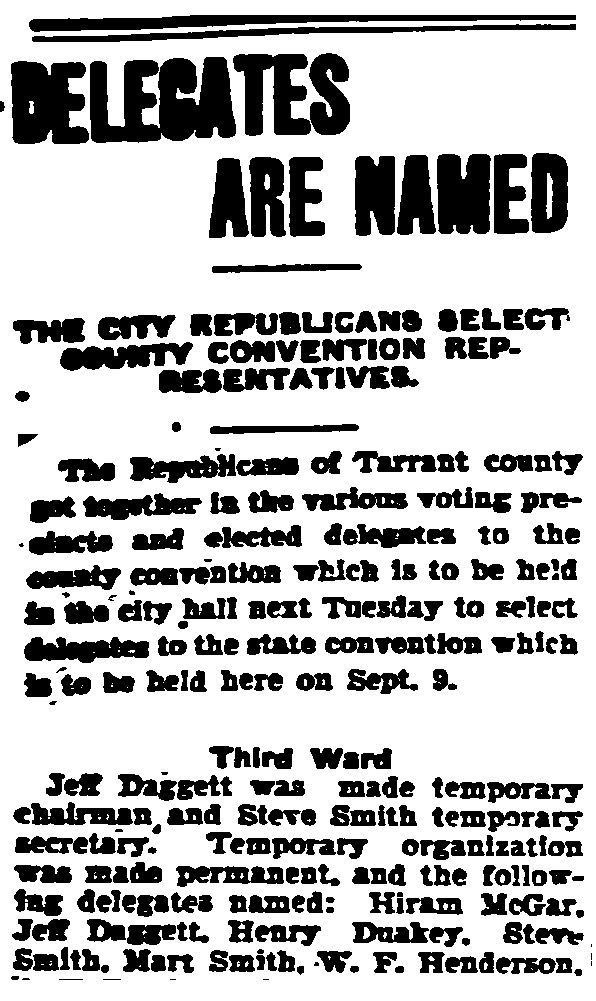 Freed after two years in prison, Jeff Daggett reformed, at least for a while. He worked as a janitor at the federal building/post office. He even became active in Republican Party politics in the Third Ward. He occasionally served as a security guard and was even made a “special officer” of the city police—a designation bestowed upon few African Americans.
Freed after two years in prison, Jeff Daggett reformed, at least for a while. He worked as a janitor at the federal building/post office. He even became active in Republican Party politics in the Third Ward. He occasionally served as a security guard and was even made a “special officer” of the city police—a designation bestowed upon few African Americans.
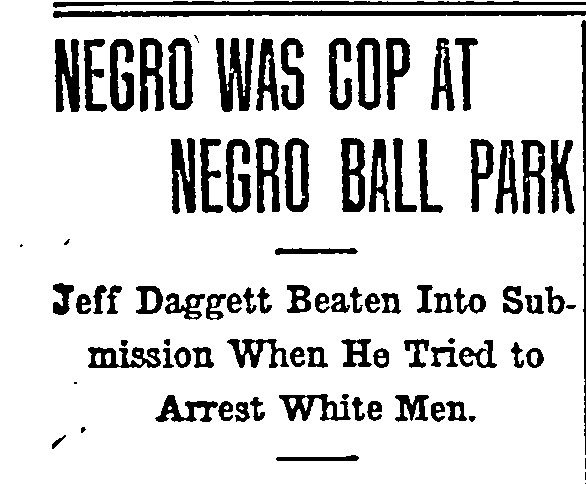 Jeff Daggett’s job as a “special officer” did not last long. In 1909 he was on duty at Douglas Park (named for—but often misspelled—African-American social reformer Frederick Douglass), Fort Worth’s first park for African Americans.
Jeff Daggett’s job as a “special officer” did not last long. In 1909 he was on duty at Douglas Park (named for—but often misspelled—African-American social reformer Frederick Douglass), Fort Worth’s first park for African Americans.
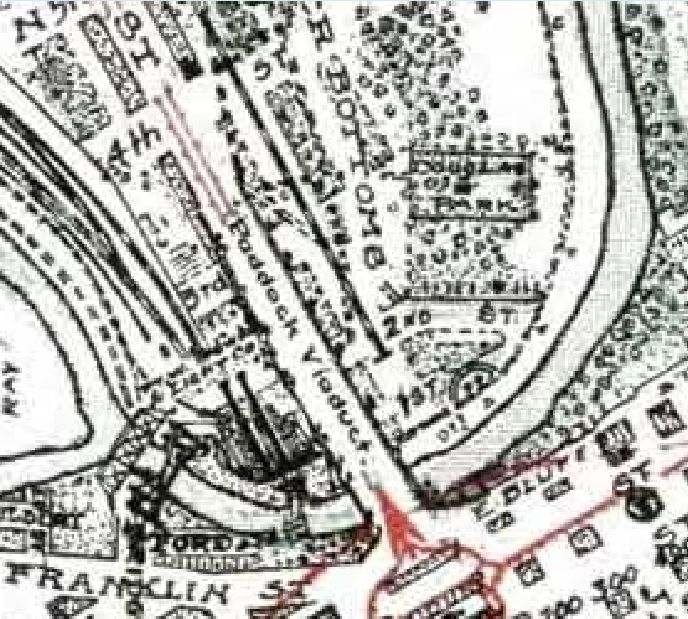 At Douglas Park Daggett attempted to arrest two white men. They beat him up. Then two white police officers arrived to arrest special officer Daggett. He resisted. They beat him up. Map shows Douglas Park east of North Main in the “Trinity River Bottoms.”
At Douglas Park Daggett attempted to arrest two white men. They beat him up. Then two white police officers arrived to arrest special officer Daggett. He resisted. They beat him up. Map shows Douglas Park east of North Main in the “Trinity River Bottoms.”
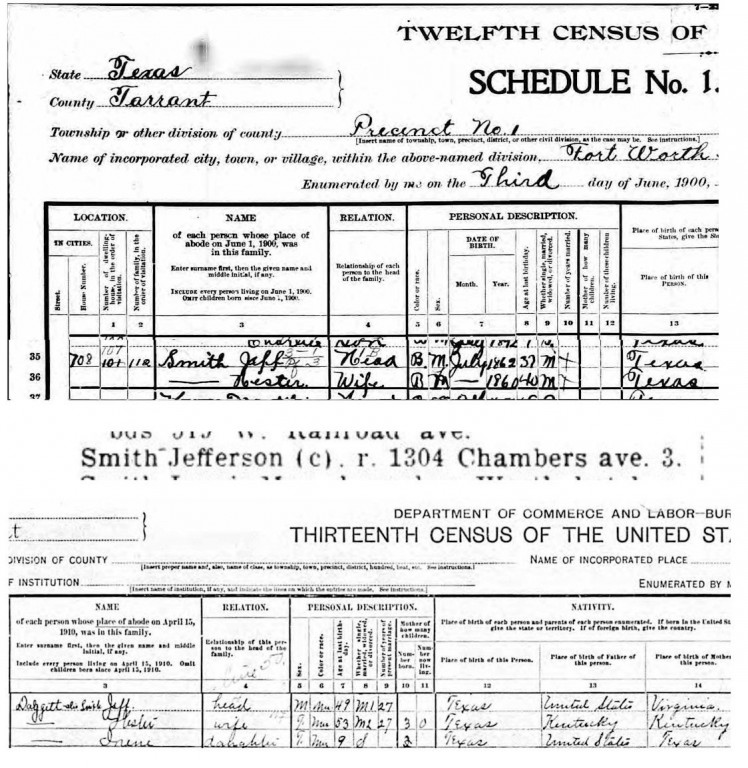 Although newspapers referred to Jeff as “Daggett,” he occasionally went by his mother’s surname. In the 1900 census and 1905 city directory he was listed as “Smith.”
Although newspapers referred to Jeff as “Daggett,” he occasionally went by his mother’s surname. In the 1900 census and 1905 city directory he was listed as “Smith.”
In the 1910 census Jeff was listed as “Daggett alias Smith.”
Chambers Street is east of downtown (where the Butler Place apartments are today) in what was then the African-American “downtown.”
 In the 1907 city directory father and son were separated by just five lines of type; their places of business were just five blocks apart, but father and son lived in different worlds.
In the 1907 city directory father and son were separated by just five lines of type; their places of business were just five blocks apart, but father and son lived in different worlds.
Jeff Daggett’s saloon at 1107 Main was located on the former Daggett plantation where he had been born.
 Jeff’s father Ephraim Beck Daggett died in 1911. Clip is from the September 10 Star-Telegram. Jeff was not listed among the survivors.
Jeff’s father Ephraim Beck Daggett died in 1911. Clip is from the September 10 Star-Telegram. Jeff was not listed among the survivors.
Six years after Jeff Daggett’s father died, Jeff got crossways with county detective Ben LeGett. In 1917 local law enforcement was clamping down on vice as the Army opened Camp Bowie. LeGett was raiding nightclubs, saloons—any place he suspected of criminal activity, but the Dallas Morning News said LeGett was “unusually vigilant in hunting down Negro lawbreakers.”
One night LeGett tried to get into an African-American nightclub where Jeff Daggett worked as a security guard. Daggett refused to let LeGett enter the club. LeGett hit Daggett in the head with his pistol. Daggett vowed to get even.
 On October 23, 1917 Jeff Daggett went to the courthouse. His intent, Selcer writes, was to file an assault complaint against LeGett. But courthouse employees heard Daggett repeat his vow to get even with LeGett. Some of LeGett’s colleagues warned him that Daggett was looking for him. LeGett took the offensive: He found Daggett in an elevator and shot him to death.
On October 23, 1917 Jeff Daggett went to the courthouse. His intent, Selcer writes, was to file an assault complaint against LeGett. But courthouse employees heard Daggett repeat his vow to get even with LeGett. Some of LeGett’s colleagues warned him that Daggett was looking for him. LeGett took the offensive: He found Daggett in an elevator and shot him to death.
Jeff Daggett, fifty-four, was unarmed.
LeGett was charged with murder but found not guilty.
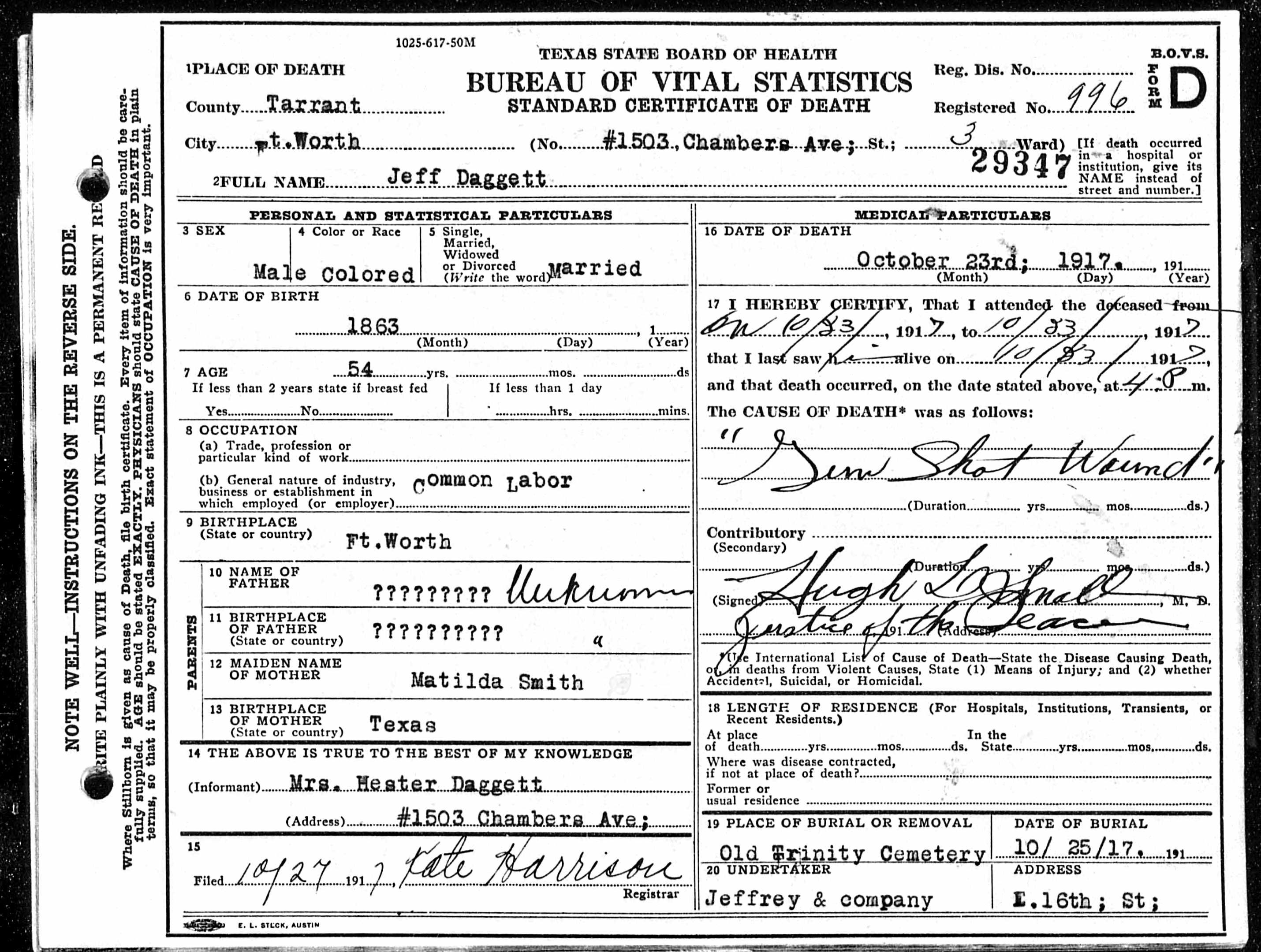
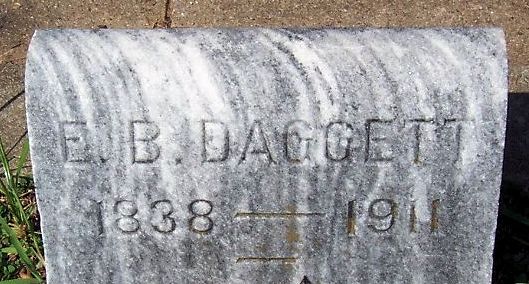 Father Ephraim Beck Daggett is buried in Oakwood Cemetery. Not far away—at least as measured in feet and inches—son Jefferson Daggett, whose father was “unknown” and whose two halves never made a whole, is buried in Trinity Cemetery, the African-American section of Oakwood.
Father Ephraim Beck Daggett is buried in Oakwood Cemetery. Not far away—at least as measured in feet and inches—son Jefferson Daggett, whose father was “unknown” and whose two halves never made a whole, is buried in Trinity Cemetery, the African-American section of Oakwood.
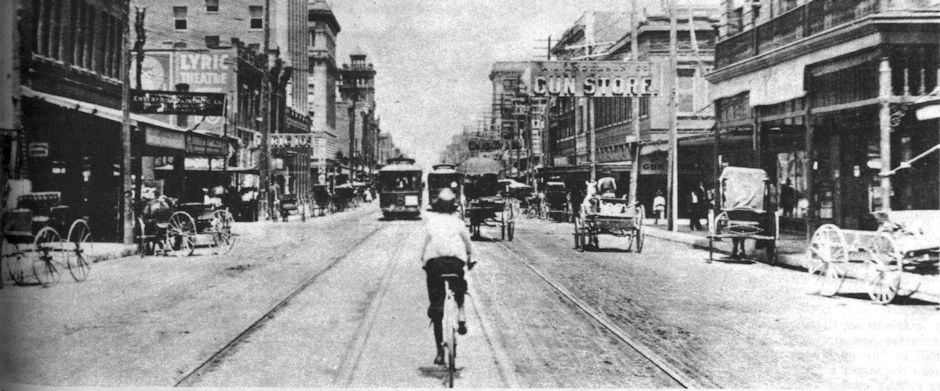





I’m coming to visit soon . Do you think I’ll be able to stay in my grandpa’s house #fort worth
Thank you for visiting the site. Unfortunately the author, Mike Nichols, passed away and we are working on how best to preserve this informative site.
I’m a Daggett & I’ve been searching about my family name but my grandfather was from Alabama although I have a connection to Tx I not able to connect the dots but this helps some..Thank you
I am a Daggett/Van Zandt/Jennings descendent and would love to find more interesting stories about the past. After reading this, I would like to hear more about “Jeff’s” side of the family. Are they doing well? ….Back to the past, does anyone have the back story on the Abolutionist & Bewley Mill? Special thank you to “hometown”
Port Daggett was a cattle buyer in the Ft. Worth Stockyards. He commissioned “Swede” Strong, Pecos, Texas, to build him a pair of Spurs, with “Port” around the heel band. Do the Spurs still exist? They may be quite valuable, if they can be located.
I have no idea and can find no mention of the spurs in old issues of the Star-Telegram. Maybe some reader will have information.
This whole affair is fascinating. Because my grandfather, Ernest Johnson, owned his barber shop in the black business section of Fort Worth, I have been hoping to find any more info on turn of the century or early 1900’s-1930’s periods there. My grandmother, Theresa B. Compton and grandfather had three children, Ernest Johnson (jr.), L. Johnson (my mom), and a third child who died early, all born in Fort Worth by 1910. I think Jeff Daggett and Ernest Johnson likely knew each other and if anyone reading this could shed any light on the senior Ernest, his barbershop, or anything else, please let me know. The Johnsons moved to Beaumont, Texas and eventually divorced.
This is incredibly fantastic work. I have started with my great grandmother Annie Davis-Daggett who married George Daggett around 1914. George’s parents were Henry and Rebecca Daggett. I’m looking up their birth years but I think they may have been born slaves or at least the children of slaves. All of them were born in Fort Worth. I truly appreciate you sharing this article.
Thanks, Karen. The surnames “Daggett” and “Van Zandt” are probably the two most associated with Fort Worth history. Good luck with your research.
That’s Fort Worth for sure.
Cause of death . . . death by misadventure.
I was born in Fort Worth in 1996, and have been a native ever since. Thank you for this blog!
Thanks, Chandler. Hope you enjoy Hometown by Handlebar.
Thank you for sharing this. My mother was Elizabeth Ray Daggett. Her Father was Raymond Daggett of the Daggett family.
“Daggett” is an awfully big name in Fort Worth history.
Can you confirm whether a part or most of the Oakhurst neighborhood (NE Ft. Worth) was part of the Daggett ranch? This would likely have been in the 19th century. Thanks, Dana Griffin III
Dana, I’d say yes. An 1885 General Land Office county map shows that the survey of Charles Biggers Daggett was centered roughly even with where Marine Creek joins the river. Mount Olivet Cemetery is on the old Daggett property, and the property extended south, probably past Yucca Avenue.